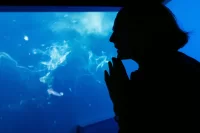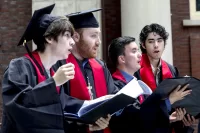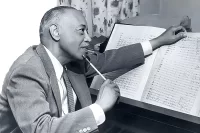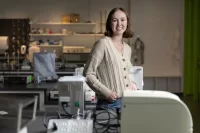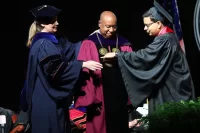
The exponential growth of computing power has been a boon to the research that Assistant Professor of Physics Jeffrey Oishi and his students do every day at Bates.
But supercomputers still can’t top the power of the human mind to ask the right research questions, he says.
Oishi recalls what one of his college professors, the famed computational scientist David Keyes, once said in class. “He said he’d rather have today’s algorithms on yesterday’s computers than yesterday’s algorithms on today’s computers.”
In other words, even with the exponential growth of computing power, “how we phrase our ideas and problems to the computer” is what matters, Oishi says. “How we phrase our questions can radically change results by a much larger factor” than any increase in computing power.
For example, just yesterday, Oishi and a long-time collaborator, Keaton Burns, found a way to solve a problem 2,000 times faster — on the same computer — simply by changing the mathematical formula slightly.”
For Oishi and the students in his lab, past and present, “that’s where the real excitement comes —in the ideas and ways of looking at problems.”
Oishi is a computational physicist. His lab, the Bates Fluid Dynamics Group, seeks to understand highly complex systems “that are far from equilibrium,” meaning that “there’s a lot of energy flowing through them. The classic examples for me are fluid turbulence in the atmosphere, the oceans, and the stars and their stellar atmospheres.”
Ask and Receive
Now in its second season, Ask the College Experts helps prospective students receive information about the college-search process. Subscribe to the Bates YouTube channel to receive new Season 2 episodes as they debut.
He’s also looked at smaller-scale problems, like the growth of bacterial biofilms that thrive on surfaces — such as industrial pipelines and medical devices. “Biofilms grow and divide and exist in a fluid medium. It’s one of the biggest problems for hospitals, for example, in intravenous lines.”
The research involves “extremely large supercomputer simulations on national-class facilities at NASA and some of the National Science Foundation centers,” he says. In addition, his students have access to the college’s high-performance computing cluster. The HPCC is a “workhorse.”
Oishi earned bachelor’s and doctoral degrees at two universities, Columbia and the University of Virginia. Now he’s teaching and doing research at Bates, and he sees the benefits for his students when it comes to doing research at a small liberal arts college.
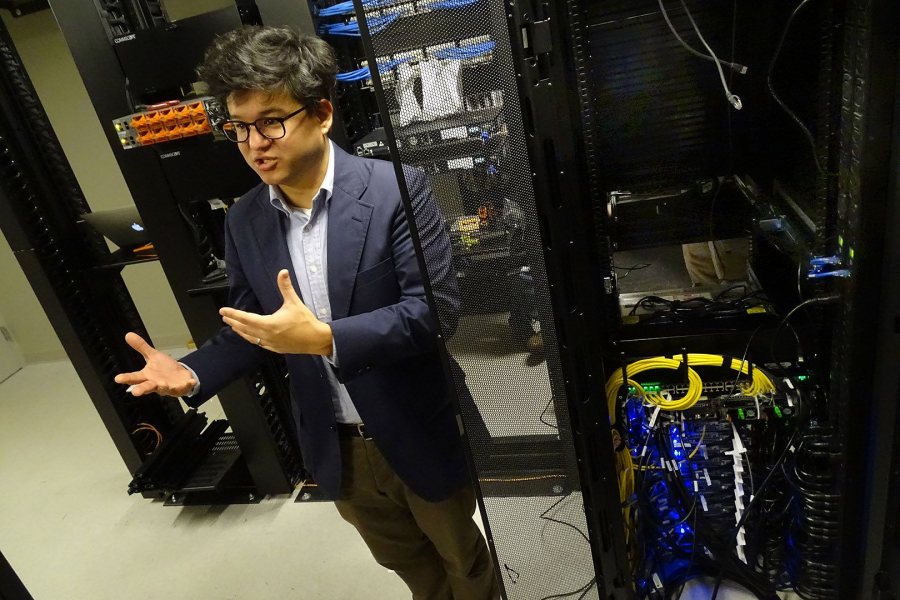
“And, importantly, the students bring value to the research work,” he adds. Last January, a student in his lab, Morgan Baxter ’20, co-authored a scholarly article published in the highly regarded Proceedings of the Royal Society A: Mathematical, Physical and Engineering Sciences.
The ample opportunities to do research is partly a numbers game. “Particularly in STEM fields, there are fewer students, and no graduate students, to do the work,” Oishi says. “So a student can be in the thick of a project from an early stage.You can quickly see what it’s like to do scientific research and find out if it’s interesting to you because it’s so vastly different than coursework.”
There’s variety, too, in the work that undergrads do. “Undergrads in my research group play a variety of roles in computational and theoretical physics,” he says, “from software development to what you might think of as traditional theoretical physics — using a pencil and paper and trying to make sense of equations.”
Students also do data analysis, “which can be done with a minimal physics background,” Oishi adds.
Doing research builds “practical skill, even if you’re doing something extremely theoretical and extremely abstract.”
Students learn the valuable, lifelong skill of searching for an answer when “you don’t know even if there’s an answer, let alone what that answer is. Learning to grapple with that, learning how to sit with that feeling, and move through it productively — that’s the single greatest benefit of doing research.”
